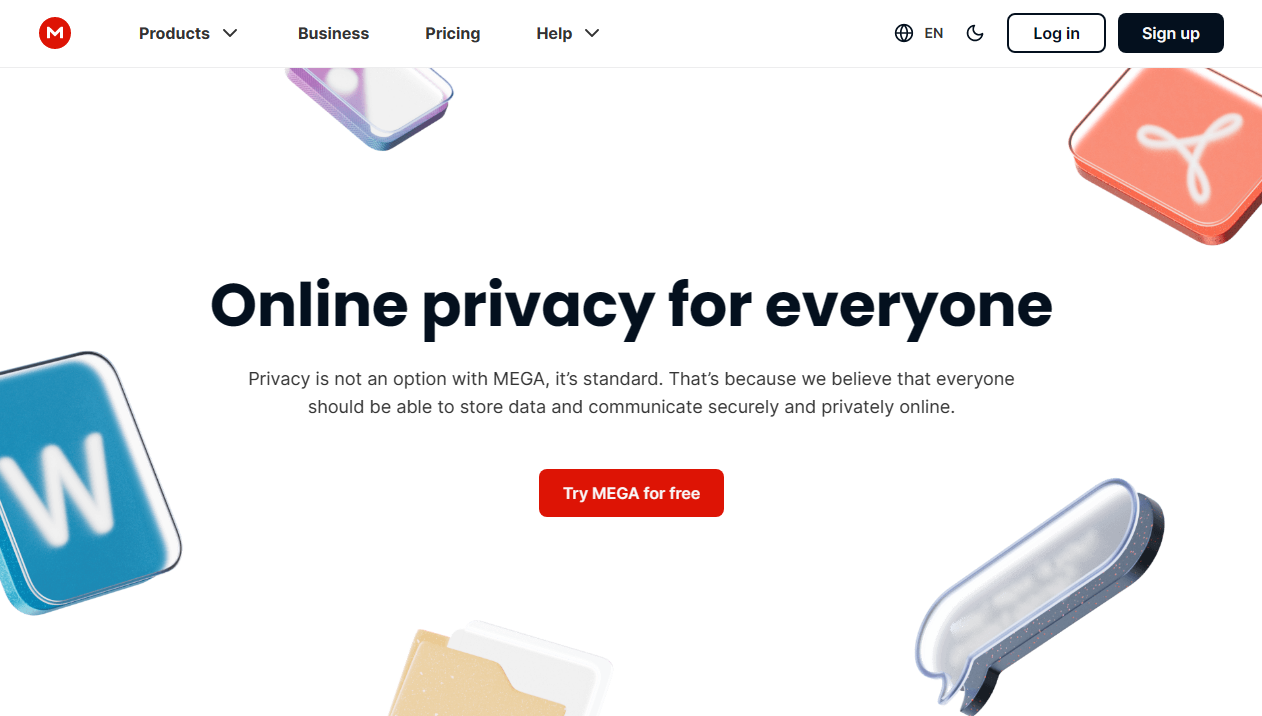TechRadar Verdict
Mega is one of the best cloud storage services around, though it lacks the suite of apps you get from the likes of Apple, Google, Microsoft and Dropbox. It has a free tier, is competitively priced, has very strong security, and is mostly very easy to use as well.
Pros
- +
Excellent security protocols
- +
Competitively priced
- +
Clean, user-friendly interface
- +
20GB free cloud storage
Cons
- -
Basic business support
- -
Limited extra apps and add-ons
- -
Lacks collaboration options
Why you can trust TechRadar
Mega, conceptualized by eccentric tech entrepreneur Kim Dotcom, who later departed the company, offers a unique approach to its cloud storage services. One of its main attractions is the array of integrated security measures available across all Mega plans, even the free tier. Notable security features include end-to-end encryption and the publication of its source code on GitHub for anyone to review for potential security vulnerabilities. Mega's user interface is user-friendly and straightforward, with tools accessible on various platforms such as Windows, macOS, Linux, Android, and iOS.
Mega: Pricing & plans
Users can receive 20GB of free cloud storage without providing credit card details. In addition to the base storage, a limited file transfer cap changes based on the available capacity on the Mega network. Extra space, up to 50 GB, can be obtained by completing tasks such as inviting friends or installing mobile apps, but this additional space will eventually expire.
There are three personal plans: Pro I, Pro II, and Pro III. The first plan offers 2TB of storage for $10.75 a month. The second plan provides 8TB for $22; the third comes with 16TB for $32. Additionally, a Business subscription starts at $16 for 3TB and three users. Mega notes that subscriptions are billed in Euros, so the estimated prices have been rounded here.
There are discounts available for yearly package purchases.
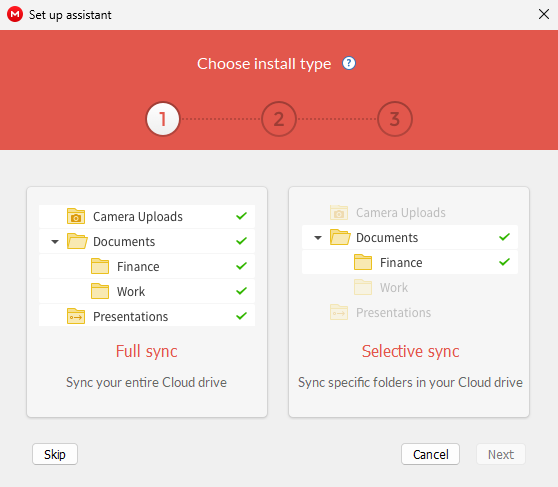
Mega: Interface
Mega’s web interface provides a slick and smooth experience. Everything is neatly laid out and accessible – whether you need to upload files or get information about your account- all is reassuringly straightforward. The web app enables viewing (or listening to) media files, documents and so on from within your browser. The functions, such as sharing files and folders are always mere clicks away, making it one of the more user-friendly cloud storage solutions that we've come across.
Along with access to Mega through the browser, there is also the option of using the MegaSync app for Windows, macOS or Linux. Just like the online interface, all is clean and well laid-out inside the desktop client to monitor any folders that you designate, syncing files analogous to Dropbox.
You can granularly control to sync your entire Mega cloud locker to your computer, or just your selected files and folders using the 'add sync' button. The app is unobtrusive and remains in the system tray when not in use.
Sign up to the TechRadar Pro newsletter to get all the top news, opinion, features and guidance your business needs to succeed!
Also impressive are the number of extensions that Mega offers, including an extension to the Thunderbird email client, to a command line interface. That this cloud storage service is built by people who are passionate about technology shows through, with an integrated, encrypted chat platform called MegaChat used to speak securely with other users, when the need arises. Like Mega itself, the chat supports end to end encryption so even company employees won't be able to read your messages.
Upload and download speeds are plenty fast when we tested them out – so with a good broadband connection, you should be fine. We really liked the desktop version, which has some extra features: the ability to throttle how much bandwidth it's using, and the option to exclude certain files from the syncing process based on their names.
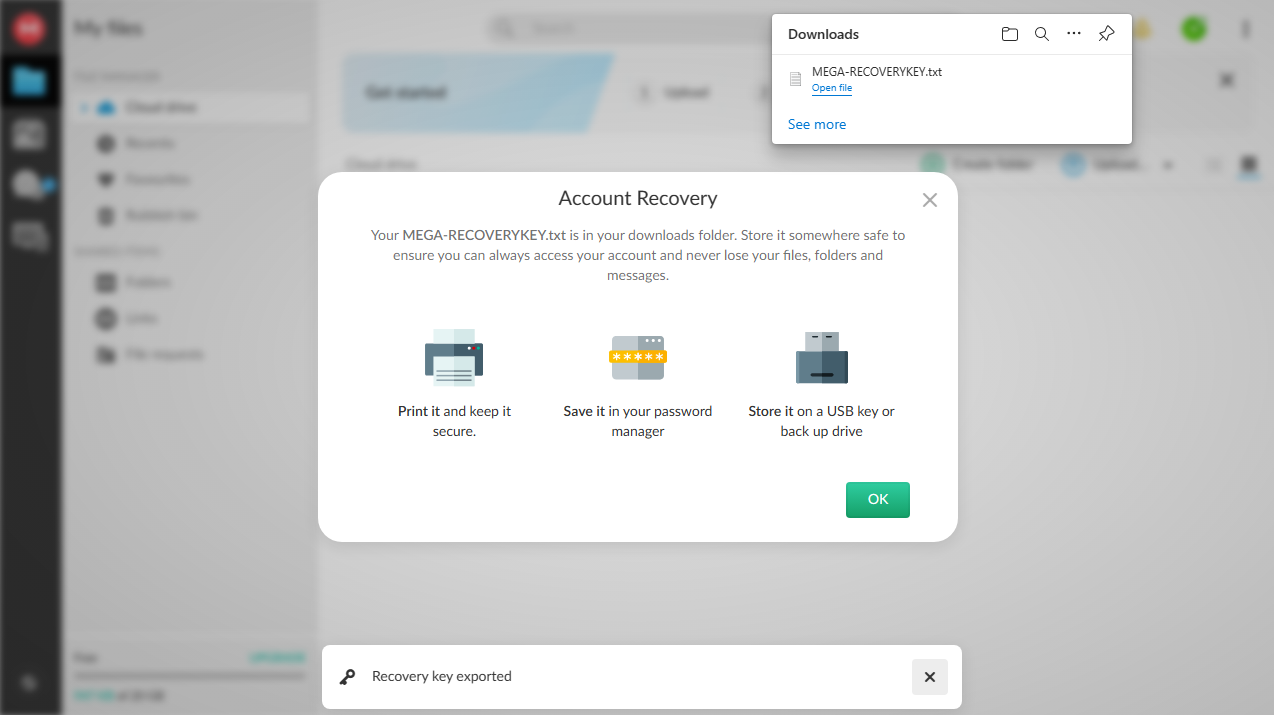
Mega: Features
Mega strikes a good balance between features and simplicity, running on just about every device. You can have it monitor specific folders on your computer, along with uploading files through the web interface. On first launch of the desktop client you're offered the option of Full Sync of all files in your home directory, or Selective Sync. If you prefer to set things up yourself manually as we did, you can also skip this and add syncs later.
Any size file can be uploaded, as long as you stay within your overall quota, with the service supporting versioning as well, enabling the retrieval of older versions of documents.
Baked right into the Mega service is file and folder sharing. It includes the option to either include the encryption key with the link which is quite convenient, or to transmit the encryption key separately, though a different channel, a nice feature to impress more security-conscious users, but perhaps not the general masses.
For an even additional layer of security, links can also be password protected, with dates of expiration assigned. These features are sadly available to Pro subscribers only.
When we tried to generate a link to share one of our test files, we received a stern warning from Mega not to share any Copyrighted material. As the company claims “Zero Knowledge" of your data, this is presumably done on an honor system.
What makes Mega stand out is these security features, with end-to-end encryption supported, and a clear emphasis on protecting your privacy throughout. There’s even a secure chat client built into the platform as well, especially useful for using Mega in a small business setting for secure communication between employees.
What’s missing from Mega is the free office software suite that other cloud providers include. That, and some of the more advanced features found in other products. However, on the whole it's a slick cloud storage solution to put the focus on protecting your data.
Uploading and syncing is a breeze, the majority of the file sharing options you're going to need are included, and your files are available from just about anywhere.
Mega: Security
An important reason that Mega attracts customers is due to its approach to security. The platform is totally end-to-end encrypted, which means not even Mega - or anyone issuing warrants to Mega - can make any sense of your data. Also keep in mind that this means that if you forget your password, you can't get your data back (you'll need to acknowledge you understand this before you create an account).
Truth be told this is not completely true: there is a recovery key in your account, but you need to jot this down somewhere else to create a proper safety net. When you first sign in to the desktop app it displays the key along with options to save or print it. Make sure to keep yours in a safe place.
Secure access to your account can also be done by optionally enabling two-factor authentication. From a security standpoint, we always like to see 2FA from a security standpoint. It shows that Mega takes privacy and security seriously. We were also pleased to see that 2FA can only be done via a legitimate authenticator app rather than SMS or email, which are less secure.
The Mega blog cautions that two-factor authentication alone isn't a magic bullet and should be combined with a strong, unique password. We recommend using Diceware.
The very best security feature in Mega's favor though is that the client apps are open source. This means the security and programming community are free to inspect the source code to make sure that end-to-end encryption is taking place in the correct way. This is very reassuring, as it's almost impossible to verify the claims of zero knowledge cloud storage providers using proprietary closed-source software.
Mega: Our tests
We conducted three tests on Mega using a Windows 11 virtual machine running the desktop client. The virtual machine was connected to the internet through fiber broadband and a VPN server, demonstrating an average upload speed of 2500 Mbps. The tests evaluated the sync speed, file recovery, and versioning.
- Test 1 - Sync speed
In our test, we used the desktop client to upload a test folder containing 232 files spread across seven folders to the Mega cloud. The total size of the files was 589MB. We were pleased to see that the app displayed the number of files remaining and the progress of the upload.
The app confirmed that all files had been successfully uploaded in only 1 minute and 40 seconds. The upload speeds were similar to those of well-known competitors like Dropbox and OneDrive.
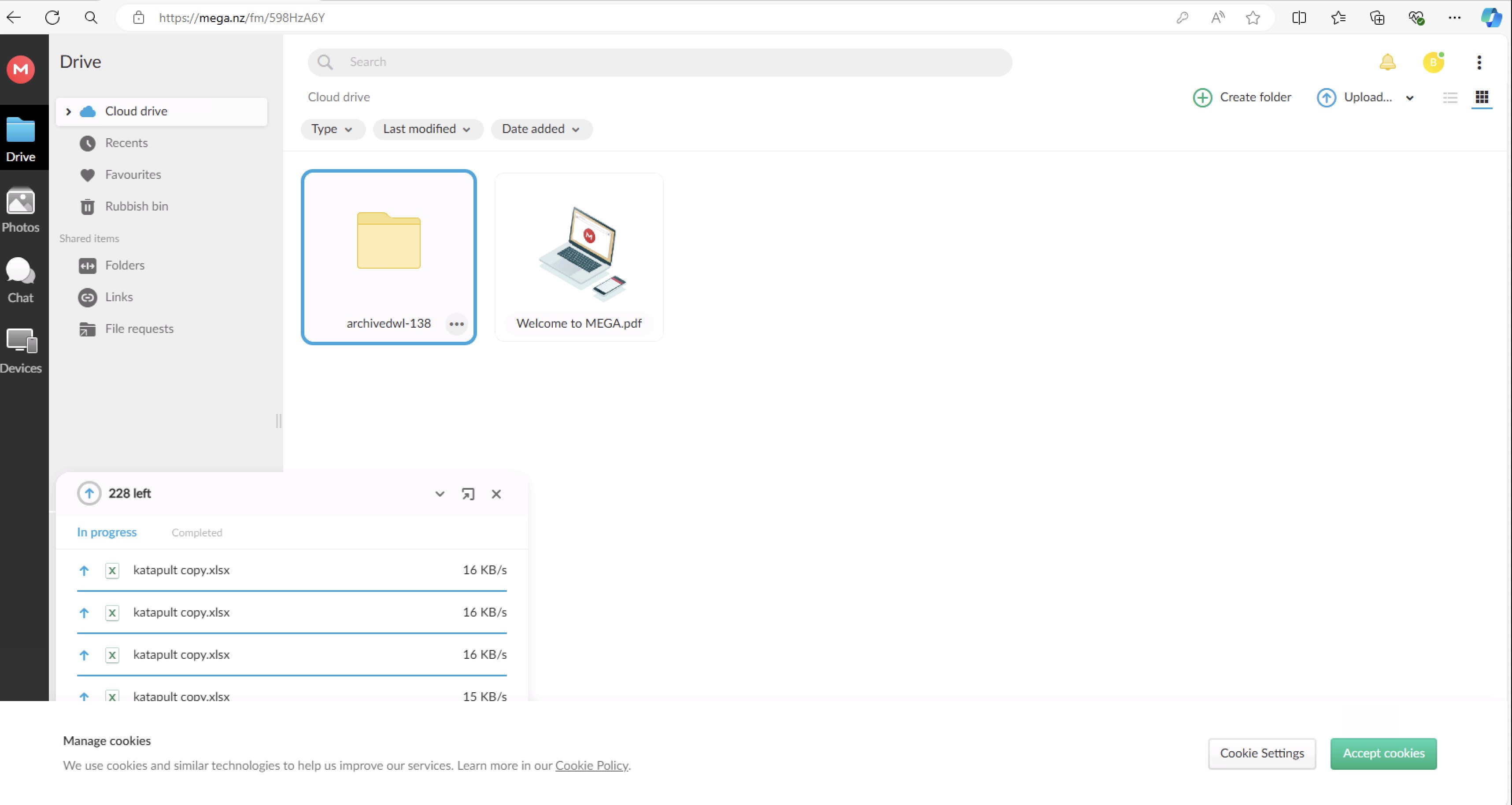
- Test 2 - File recovery
After uploading our test folder to the Mega cloud, we accessed the web portal and selected "Move to Rubbish Bin." Upon opening the Rubbish Bin, we immediately saw the folder and were able to click "Restore."
The Mega web interface is great for previewing files, so we used this feature to open images and a few audio tracks to confirm that the restoration was successful.
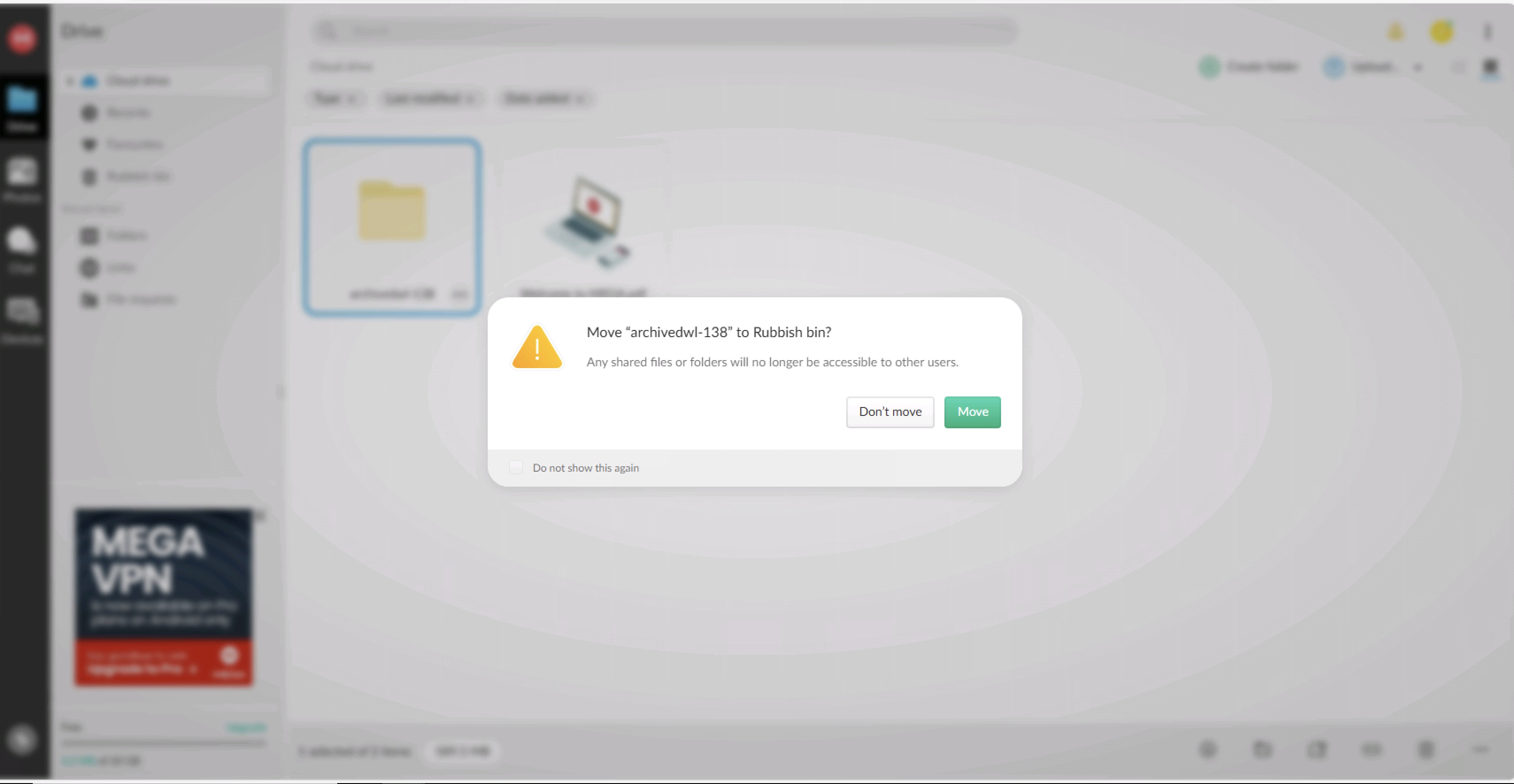
- Test 3 - Versioning
You must choose a specific folder on your local device when using Mega's file syncing feature, known as Add Sync. We organized our test document into its folder and then created a corresponding folder in the cloud.
After synchronization, we opened the document and deleted all the text except for the introduction. Once these changes were synced, we accessed the Mega Cloud and selected the file in the virtual drive.
While there, we discovered the Previous Versions feature, which displayed both the original and modified versions of the document. We could then easily click the Revert button to undo our changes.
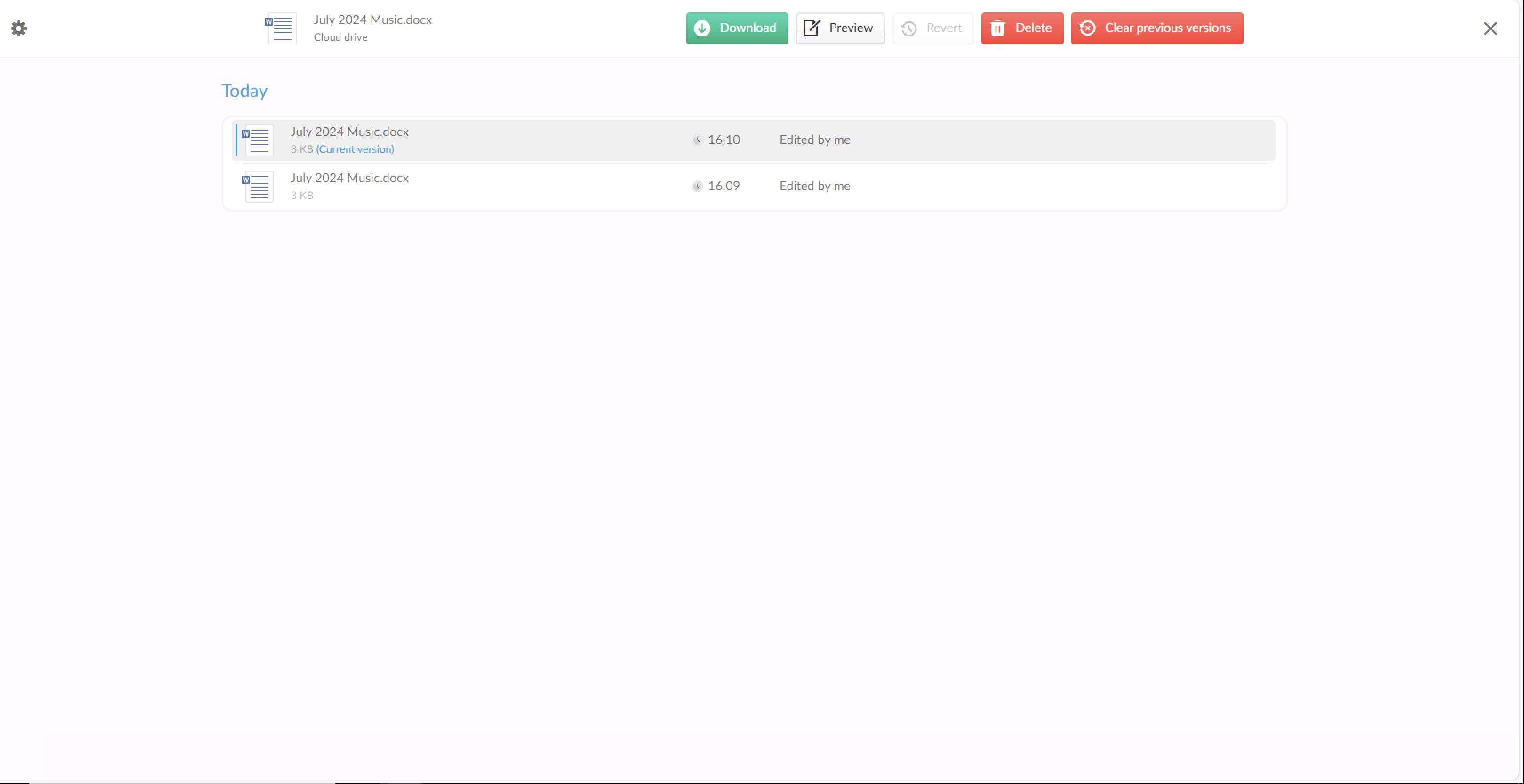
Mega: Verdict
Mega has plenty of appeal, certainly among users who value privacy and security above most other considerations. Having been able to use the various apps and features, it’s easy to say how easy it is to get around the service while finding all the tools needed. Mega caters to both absolute beginners of cloud storage, along with the more advanced users who can take advantage of such features as encrypted chat or a command line interface.
There is also an appeal for enterprise users as well, with its extra user management features, secure built-in chat, and the ability for easy file sharing with folks not on Mega. Overall, Mega has a clean, easy-to-use interface with plenty of useful features.
While it doesn't quite have the scope of some other cloud services, it can edge out many of them on price, and the security measures of Mega are indeed impressive.

Dave is a freelance tech journalist who has been writing about gadgets, apps and the web for more than two decades. Based out of Stockport, England, on TechRadar you'll find him covering news, features and reviews, particularly for phones, tablets and wearables. Working to ensure our breaking news coverage is the best in the business over weekends, David also has bylines at Gizmodo, T3, PopSci and a few other places besides, as well as being many years editing the likes of PC Explorer and The Hardware Handbook.
